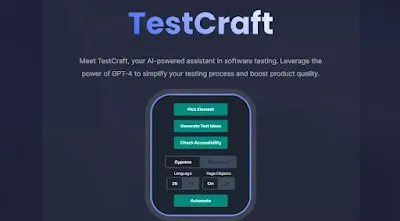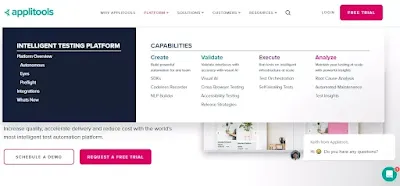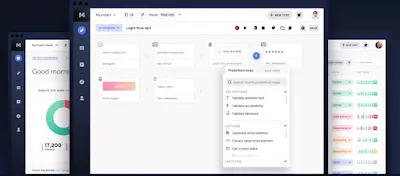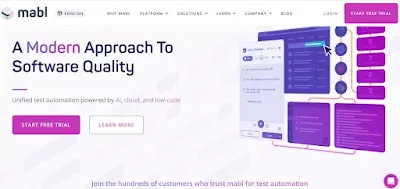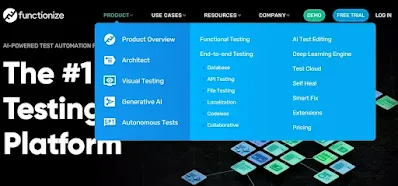Streamlining Your Testing Process with Automation Tools
In 2024, AI tools for automation testing are becoming indispensable, revolutionizing quality assurance and software testing by enhancing efficiency and accuracy. These tools, pivotal in transforming the landscape of software development, are driving advancements in quality assurance, API testing, and AI software testing, underscoring the importance of AI in test automation for optimizing development processes. They not only streamline testing processes but also significantly improve user experiences by delivering quicker, more accurate results with less manual effort, pointing towards a future where AI-driven test automation, including AI UI testing and AI for test automation, plays a fundamental role.
As the industry pivots towards incorporating AI-based test automation, understanding the top tools in this space becomes crucial. This article aims to explore seven key AI tools for automation testing in 2024, including Selenium, Testsigma, and Katalon Studio among others. By focusing on how these tools leverage AI for test automation to enhance software testing with AI, from increasing test coverage to refining products, we aim to provide insights into how AI-driven test automation can lead to greater accuracy, reduced manual effort, cost savings, and ultimately, higher quality software products.
Table Of Content
Introduction
Overview of the significance of AI in automation testing.
Overview of AI in Automation Testing
- Discusses the role of AI in enhancing the capabilities of automation testing tools.
Testsigma
- An in-depth look at Testsigma, focusing on its AI-driven capabilities for test automation.
Katalon Studio
- Exploration of Katalon Studio's features and how it integrates AI for improved testing efficiency.
Selenium
- Analysis of Selenium’s adoption of AI elements to streamline and enhance testing processes.
TestCraft
- A review of TestCraft's AI features that assist in scriptless test automation.
Applitools
- Details on how Applitools uses AI to revolutionize visual testing.
Testim
- Insight into Testim's use of AI to simplify the creation and maintenance of automated tests.
mabl
- Examination of mabl’s AI-infused testing solutions for end-to-end automation.
Functionize
- Evaluation of Functionize's architecture, focusing on AI-driven test creation and management.
Conclusion
- Summarizes the impact of AI on the future of automation testing and the potential advancements in the field.
Overview of AI in Automation Testing
The integration of Artificial Intelligence (AI) in automation testing tools marks a significant advancement in the field of software testing. The AI revolution in automation testing tools in 2024 is characterized by several transformative features and capabilities that streamline the testing process and enhance the effectiveness of quality assurance strategies. Here are some of the key attributes and benefits of AI-powered tools in automation testing:
Self-Healing and Maintenance: AI and Machine Learning (ML) algorithms provide self-healing capabilities that automatically detect changes in the application and adjust the test scripts accordingly. This reduces the maintenance time and cost significantly, making the process more efficient.
- Example: AI-powered tools can identify changes in an e-commerce web application and automatically modify the test automation script to fix issues without human intervention.
Test Creation and Execution:
- Natural Language Processing (NLP): AI simplifies test case creation using natural language processing, allowing testers to write test cases in plain English. This increases accessibility and reduces the need for specialized coding skills.
- Speed and Efficiency: AI enhances test execution by enabling the execution of thousands of tests in minutes with high precision. This capability supports a wide range of environments and devices, including over 800 browser and operating system combinations and 200 mobile emulators and simulators.
Enhanced Test Coverage and Real-Time Reporting:
- Comprehensive Coverage: AI-powered tools offer extensive test coverage, ensuring that all aspects of the application are thoroughly tested across various data and scenarios.
- Real-Time Insights: AI-powered reporting tools provide real-time insights into test results, helping testers to identify patterns, trends, and potential issues quickly. This data-driven approach aids in making informed decisions and enhances the overall quality of the software product.
These AI-driven enhancements not only improve the accuracy and reliability of testing processes but also contribute to a more agile and responsive development environment. The ability to quickly adapt to changes and predict potential issues before they arise underscores the pivotal role of AI in the future of automation testing.
Testsigma
Testsigma emerges as a robust contender in the AI tools for automation testing landscape, offering a versatile range of product editions tailored to meet diverse testing needs. These editions include Testsigma Cloud, Community Edition, and Testsigma Enterprise, each designed to cater to different scales and types of software development projects.
Key Features and Capabilities:
- AI-Driven Test Automation: Leveraging AI, Testsigma enhances test creation and execution, featuring capabilities like the AI Suggestion Engine and automated maintenance of test scripts. This reduces manual effort significantly while increasing efficiency.
- Comprehensive Testing Solutions: It supports a variety of testing types such as web application testing, mobile app testing, API testing, and more. Specific use cases include regression testing, cross-browser testing, data-driven testing, and continuous testing, among others.
- Enhanced Test Management and Execution: Testsigma provides advanced test management features like TestOps, test versioning, and user and role management. For test execution, it offers scheduled runs, parallel testing across multiple browsers and devices, and local testing options.
Integration and Compatibility:
- Extensive Integration Options: Seamlessly integrates with a wide range of CI/CD, bug tracking, collaboration, and product management tools, enhancing the overall delivery pipeline. Notable integrations include Zapier and Slack, with additional options detailed on their website.
- Cross-Platform Compatibility: Testsigma is compatible with over 800 browsers and 2000 devices, ensuring comprehensive test coverage and the ability to run tests both on the cloud and locally.
By incorporating these advanced features, Testsigma not only streamlines the testing process but also aligns with modern development practices such as Continuous Delivery and DevOps, making it a valuable tool for both SMEs and QA Analysts. With its user-friendly interface, Testsigma allows functional QAs to easily write or auto-capture test steps in plain English, enhancing accessibility and reducing the learning curve associated with automated testing tools.
Katalon Studio
Katalon Studio, a key component of the Katalon quality management platform, is recognized for its comprehensive capabilities in AI-powered testing. This robust tool supports a variety of testing types including web, API, desktop, enterprise app, and mobile testing, making it a versatile choice for quality assurance professionals. Here are some of the standout features and functionalities of Katalon Studio:
Key Features and Capabilities:
- AI-Powered Testing Tools: Katalon Studio enhances test automation with features like TrueTest and Visual Testing, which leverage AI to improve test accuracy and efficiency.
- Diverse Testing Support: The platform allows for testing across multiple environments—web, API, desktop, and mobile—all within a single project, facilitating seamless integration and consistency in testing procedures.
- Industry Adaptability: With tailored solutions for sectors such as finance, healthcare, telecoms, retail, utility, and government, Katalon Studio meets the specific compliance and security needs of various industries.
Advanced Testing Features:
- Automated API Testing: Katalon Studio excels in automated REST and GraphQL API testing, enabling comprehensive coverage and ensuring robust backend functionality.
- Enhanced Visual Testing: The tool's advanced AI algorithms minimize flaky pixel visual UI comparisons, significantly enhancing the reliability of visual tests.
- Cloud Testing Capabilities: Users can execute tests in click-and-run cloud environments, which support native apps and mobile browsers, simplifying the setup and scalability of test environments.
Integration and Security:
- Shift Left and Shift Right Testing: Katalon supports Shift Left API testing by allowing direct import of web service endpoints and integrates with OctoPerf for Shift Right performance testing, ensuring performance optimization from development to production.
- Security and Compliance: Centralized security settings for administrators include features like idle session timeout, custom domains, SSO, and IP address restrictions, enhancing the security posture of the testing environment.
- AI-Enhanced Test Management: The introduction of the Virtual Data Analyst, a new AI feature, acts as a personal assistant, offering insights on readiness to release, common errors, and test stability, which are crucial for maintaining high standards of quality assurance.
By integrating these sophisticated features, Katalon Studio not only streamlines the testing process but also aligns with modern development practices, making it an essential tool for ensuring the quality and reliability of software applications across various industries.
Selenium
Selenium remains a cornerstone in the realm of AI tools for automation testing, renowned for its adaptability and comprehensive support across various programming languages and browsers. Its open-source nature further enhances its appeal, providing a flexible platform for developers and testers worldwide.
Key Features of Selenium:
- Flexibility and Multi-Language Support: Selenium supports multiple programming languages including Java, C#, Python, and Ruby, allowing seamless integration into diverse development environments.
- Cross-Browser Compatibility: It offers extensive compatibility across major browsers like Chrome, Firefox, Safari, and Internet Explorer, enabling consistent testing across different user environments.
Innovative frameworks built on Selenium, such as Healenium and Webomates-CQ, further extend its capabilities by integrating AI and ML to address common challenges in automation testing:
Healenium:
- Self-Healing Mechanism: Healenium is designed to enhance the stability of Selenium-based tests. It automatically detects and corrects changes in the locators of web elements, which are often a major cause of test failures.
- Reduced Maintenance Effort: By fixing locator issues, Healenium cuts down on the time and effort required for test maintenance, allowing teams to focus more on new features and less on fixing broken tests.
Webomates-CQ:
- AI and ML Integration: Webomates-CQ applies advanced AI and machine learning algorithms to adapt testing strategies dynamically. This helps in accommodating changes in the application during the development cycle.
- Dynamic Testing Scope: The framework adjusts its testing scope based on real-time changes, ensuring that the tests are always relevant and effective, thereby improving the quality assurance process.
These enhancements make Selenium not just a tool for automation testing, but a robust platform that evolves with technological advancements, ensuring high efficiency and reliability in testing processes.
TestCraft
TestCraft stands out in the realm of AI tools for automation testing with its pioneering approach to codeless test automation. This platform is designed to make test automation both accessible and efficient, particularly benefiting those who may not have extensive coding expertise. Here's a closer look at what makes TestCraft a notable tool in this innovative field:
Key Features and Capabilities:
- Codeless Test Creation: Utilizing a visual interface, TestCraft allows testers to create tests by directly interacting with the application’s UI elements. This approach not only simplifies the test creation process but also accelerates it, making it accessible to professionals with varied technical skills.
- AI-Driven Self-Healing: One of the standout features of TestCraft is its AI-driven self-healing capabilities, which automatically adjust test scripts when changes are made to the application’s UI. This significantly reduces the maintenance required and enhances test sustainability over time.
- Cross-Browser and Concurrent Testing: TestCraft supports testing across multiple browsers, ensuring that applications perform well in diverse environments. Additionally, it allows multiple tests to run concurrently, which slashes the total time spent on testing and boosts efficiency.
Integration and Collaboration:
- CI/CD Integration: Seamlessly integrating with CI/CD pipelines, TestCraft ensures that automated testing is a continuous part of the development process, aiding in quicker releases and higher quality software builds.
- Real-Time Collaboration: The platform enhances teamwork by providing shared workspaces for test creation and management, facilitating real-time collaboration among team members which is crucial for agile environments.
Advanced Analytics and Customization:
- Comprehensive Reporting: TestCraft provides detailed test execution reports and analytics, offering insights into test performance and helping identify trends and areas for improvement in the application’s quality.
- Customizable Testing Options: Testers can further tailor their testing processes by incorporating custom JavaScript or TypeScript code, with or without page object modeling, depending on the project’s needs.
By integrating these features, TestCraft not only streamlines the testing process but also aligns with modern development practices, ensuring that teams can maintain high standards of quality assurance efficiently. With its commitment to leveraging AI, TestCraft continues to evolve, aiming to remain at the forefront of the software testing industry.
Applitools
Applitools stands at the forefront of AI tools for automation testing, offering a suite of features designed to enhance the quality and efficiency of software testing. Here’s an in-depth look at its core functionalities:
Key Features of Applitools:
Autonomous Testing:
- Automated Maintenance & Self-Healing Tests: Automatically adjusts test scripts to accommodate changes in the application, significantly reducing maintenance efforts.
- Root Cause Analysis: Pinpoints the exact failure points in tests, facilitating quicker debugging and resolution.
Eyes - Visual AI Testing:
- Visual AI: Utilizes advanced algorithms to mimic human vision and cognition, detecting visual and functional discrepancies with high precision.
- Cross Browser & Accessibility Testing: Ensures consistent user experience across various browsers and enhances accessibility compliance, making applications more inclusive.
Preflight Capabilities:
- NLP Builder & Codeless Recorder: Simplifies test creation by allowing tests to be written in natural language and recorded without coding, making the tool accessible to non-technical users.
Integration and Scalability:
- Broad Integration Support: Works seamlessly with tools like Storybook Components, and various platforms including websites and native mobile applications, ensuring flexibility across different tech stacks.
- Scalable Infrastructure: Capable of handling large-scale applications and frequent updates, ideal for dynamic testing environments.
Advanced AI Features and Industry Solutions:
- Intelligent Test Infrastructure & Test Orchestration: Streamlines test processes and optimizes resource allocation for efficient test execution.
- Industry-Specific Solutions: Offers tailored testing solutions by industry, ensuring that specific compliance and security standards are met.
Applitools leverages its robust AI capabilities to reduce the manual effort required in testing, expand test coverage, and improve the precision of test results. This not only enhances the development cycle but also ensures that the end products meet the highest standards of quality and user satisfaction. By integrating with popular testing frameworks like Selenium and Cypress, Applitools enhances test stability, making it a versatile choice for modern software development teams.
Testim
Testim stands out in the AI tools for automation testing landscape, particularly for its focus on AI-based UI testing and mobile testing capabilities for both iOS and Android platforms. Geared towards a diverse user base including engineers, agile teams, and Salesforce admins, Testim offers a suite of tools designed to enhance the efficiency and accuracy of software testing processes.
Key Features and Capabilities:
- AI-Driven Test Automation: Testim utilizes AI to enhance test authoring speed while maintaining flexibility, enabling rapid creation and execution of tests with minimal setup.
- Test Stability and Maintenance: The platform features advanced algorithms for root cause analysis which aids in precise troubleshooting, reducing the time spent on identifying issues.
- Scalable Test Operations (TestOps): Testim supports efficient scaling of testing operations, making it suitable for both small projects and large enterprise environments.
Integration and Usability:
- Extensive Documentation and Tools: Developers have access to comprehensive documentation, along with tools like recorders for Puppeteer and Playwright, which simplify the process of creating and managing tests.
- Changelog and Updates: Regular updates and a detailed changelog ensure users are well-informed of new features and improvements.
Advanced AI Features:
- Self-Improving and Self-Healing Tests: Testim's AI capabilities include self-improving stabilizers and smart locators that adapt to changes in the application under test, such as modifications in color, text, or layout, ensuring tests remain robust and reliable.
- Enhanced Test Reliability: Automated waits and proactive adjustments to locators enhance the reliability of automated tests, minimizing disruptions caused by dynamic elements of the application.
Efficiency Tools:
- Code Reuse and Optimization: With features like Shared Steps and Groups, Testim emphasizes code reuse, allowing users to write methods once and reuse them across multiple tests, reducing redundancy and enhancing test efficiency.
- Auto-Grouping Functionality: This feature identifies frequently duplicated steps and replaces them with shared groups, streamlining the test creation process.
Testim's approach to AI-driven test automation not only simplifies the testing process but also ensures high-quality outcomes, making it a preferred tool among modern software development teams. Its capabilities to adapt to layout changes and validate almost any element or text on the screen further underscore its position as a versatile and powerful testing solution.
mabl
Key Features and Benefits of mabl:
- Unified Platform: mabl is a unified test automation platform, leveraging cloud, AI, and low-code innovations to ensure high-quality software throughout the user journey. Its SaaS nature facilitates scalability and ease of use across various testing types.
- Comprehensive Testing Range: Supports functional and non-functional testing including web apps, mobile apps, APIs, as well as performance and accessibility testing.
- AI-Driven Autohealing: Features native autohealing capabilities that capture over 35 unique element attributes during test creation and execution, significantly reducing time spent on test maintenance.
Integration and Learning Resources:
- Extensive Integration Capabilities: mabl integrates with a multitude of tools such as Jira, Postman, GitHub, Gitlab, Jenkins, Segment, Slack, and MS Teams, enhancing its utility in diverse development environments.
- Educational and Support Resources: Offers mabl University, a comprehensive learning platform for test automation skills, alongside an active blog, resource library, and participation in various industry events. These resources are designed to keep users informed and skilled in the latest testing practices.
Target Audience and Accessibility:
- Designed for Diverse Users: Whether it's QA teams, developers, or executives, mabl offers tailored solutions to meet the needs of various stakeholders in the software development process.
- Solutions for Various Use Cases: Includes increasing test coverage, reducing manual testing efforts, supporting end-to-end user journeys, and providing an alternative to traditional tools like Selenium. It also specializes in automated regression testing and Salesforce test automation, showcasing its versatility.
By incorporating these advanced features and broad support capabilities, mabl not only streamlines the testing process but also aligns with modern development practices, ensuring that teams can maintain high standards of quality assurance efficiently.
Functionize
Functionize, founded in 2014 and headquartered in Walnut Creek, USA, has rapidly positioned itself as a leader in AI-powered automation testing. Their cloud-based platform is designed to streamline the quality assurance process by minimizing the reliance on traditional test scripts and extensive QA teams. Here's how Functionize stands out in the market:
Innovative AI Capabilities:
- Generative AI Technology: Automates the test crafting process, significantly reducing the time and effort involved in setting up tests.
- Intelligent Test Management: The test cloud feature facilitates efficient management and execution of tests, enhancing productivity and scalability.
Flexible Service Plans and Integration:
- Service Plans: Functionize offers two flexible plans, Team and Enterprise, catering to different organizational needs and scales.
- Tool Integration: The platform integrates seamlessly with popular tools like Xray, Jira, TestRail, and Zephyr Squad, ensuring a smooth workflow within diverse IT ecosystems.
Educational and Support Resources:
- Comprehensive Learning Materials: Functionize provides a variety of educational resources including eBooks, webinars, tutorials, and white papers, all aimed at enhancing user understanding and proficiency in automated testing.
- Certification Programs: These programs are designed to help users validate their expertise in using Functionize, further adding value to their professional skill set.
By leveraging advanced AI and machine learning technologies, Functionize not only enhances test accuracy and efficiency but also reduces operational complexity, making it an ideal solution for companies looking to accelerate their software release cycles while maintaining high standards of quality.
Conclusion
The exploration of AI tools for automation testing reveals a compelling landscape poised to redefine the parameters of software testing and quality assurance. By harnessing the capabilities of AI, tools such as Selenium, Testsigma, and Katalon Studio, among others, offer unprecedented efficiency, precision, and adaptability. This analysis underscores the transformative potential AI holds in enhancing test coverage, reducing manual effort, and facilitating more agile development processes. The significance of these developments cannot be overstated, as they not only streamline the testing process but also elevate the end-user experience by ensuring software products are of the highest quality.
As we look to the future, the call to action is clear: embracing AI in automation testing is no longer an option but a necessity for those seeking to stay at the forefront of technological innovation. The implications for the software development and quality assurance fields are profound, signaling a shift towards more intelligent, efficient, and reliable testing methods. This journey into the AI revolution in automation testing opens new avenues for exploration and growth, promising to reshape our approach to quality assurance in an ever-evolving digital world.
FAQs
What can we expect for the future of test automation in 2024? In 2024, the trend towards smart testing is expected to rise, utilizing advanced test automation platforms that execute complex user behaviors. Developers will benefit from automated compliance channels that intelligently select the appropriate tests for each code check-in.
What AI-powered tool is recommended for automation testing? TestCraft is a recommended AI-powered automation testing platform, particularly useful for regression and continuous testing, and it performs well in monitoring web applications.
Is there a risk of AI replacing automation testers? AI and automation are unlikely to render software testers obsolete. Rather, these technologies are poised to revolutionize software testing by increasing efficiency and effectiveness. They help expand test coverage, enhance accuracy, and improve the maintainability of software testing processes.
Which automation testing tool is expected to be in demand in the future? While the specific tools can vary, those that integrate AI capabilities and offer comprehensive testing solutions are expected to be highly sought after in the evolving tech landscape.

.png)
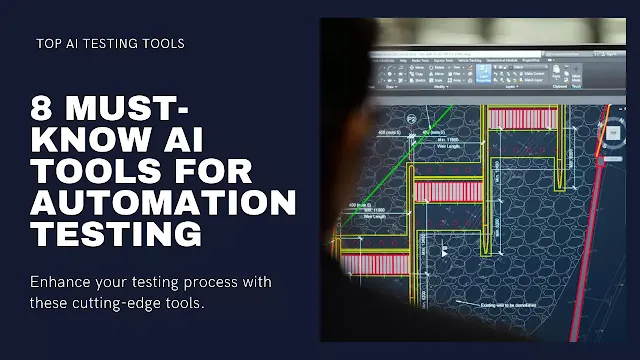
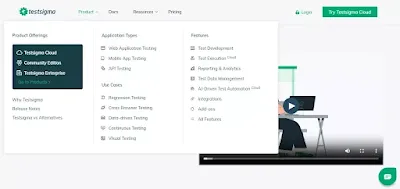
.webp)

